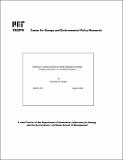Allowance trading activity and state regulatory rulings : evidence from the U.S. Acid Rain Program
Author(s)
Bailey, Elizabeth M.
Download98005.pdf (199.4Kb)
Other Contributors
Massachusetts Institute of Technology. Center for Energy and Environmental Policy Research.
Metadata
Show full item recordAbstract
The U.S. Acid Rain Program is one of the first, and by far the most extensive, applications of a market based approach to pollution control. From the beginning, there has been concern whether utilities would participate in allowance trading, and whether regulatory activity at the state level would further complicate utilities' decision to trade allowances. This paper finds that public utility commission regulation has encouraged allowance trading activity in states with regulatory rulings, but that allowance trading activity has not been limited to states issuing regulations. Until there is evidence suggesting that significant additional cost savings could have been obtained if additional allowance trading activity had occurred in states without regulations or that utilities in states with regulations are still not taking advantage of all cost saving trading opportunities, this analysis suggests that there is little reason to believe that allowance trading activity is impeded by public utility commission regulations.
Date issued
1998Publisher
MIT Center for Energy and Environmental Policy Research
Other identifiers
98005
Series/Report no.
MIT-CEEPR (Series) ; 98-005WP.